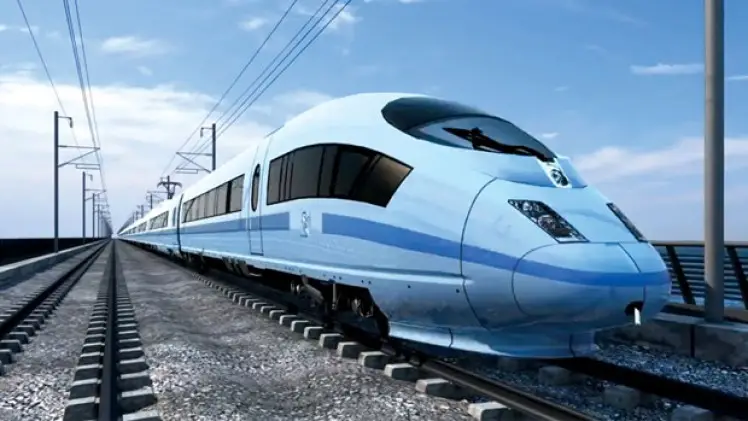Delegates at the Green Party conference in Manchester have cast a decisive vote in favour of completing the HS2 project in its entirety. This critical decision marks a shift in policy and supports the completion of the entire Eastern leg and an underground through station at Manchester Piccadilly.
The Green Party’s updated stance highlights the importance of addressing capacity issues on the railways and tackling regional inequalities. Additionally, the conference has shown strong support for the Northern Powerhouse Rail project, aiming to enhance connectivity across the North of England.
Revised Policy on HS2
The Green Party has resolved to support the completion of HS2 in full, including the Eastern leg and the underground station at Manchester Piccadilly. The decision reflects a pragmatic approach, as much of the environmental impact is already established with the progress of the first phase between London and Birmingham. This phase is significantly advanced, embedding most environmental ramifications.
Co-leader Carla Denyer MP conveyed that the northern leg of HS2 is crucial for resolving capacity issues and addressing regional disparities. She emphasised the need for the railway to be constructed responsibly, balancing ecological considerations with the needs of local communities and financial prudence.
Denyer stated, “We need to move at great speed to shift travel away from cars and flights to public transport. HS2, in full, can play an important role in achieving this shift.” This highlights the party’s commitment to sustainable and efficient public transportation.
Support for Northern Powerhouse Rail
In addition to backing HS2, the Green Party is also advocating for Northern Powerhouse Rail. This high-speed rail line is designed to connect Liverpool, Manchester, Bradford, Leeds, and extend to the east coast. This initiative aims to rectify historic underinvestment in the North’s rail infrastructure.
Councillor Matt Edwards, the Green Party’s transport spokesperson and leader of the Green Group on Bradford Council, expressed delight over the conference’s support for Northern Powerhouse Rail. He stressed the necessity of proper investment in high-speed rail to mitigate pollution and carbon emissions from transport.
Edwards remarked, “If we want to do something to address this, we need to invest in high-speed rail – but it has to be done right. Putting passengers and our planet at the heart of the project.”
Environmental and Social Considerations
The Green Party’s support for HS2 and Northern Powerhouse Rail comes with strict conditions. They insist on railways being built in a way that preserves habitats, benefits local transport users, and considers the needs of affected neighbours. The party is adamant about not endorsing blank cheques for these projects.
Denyer reiterated that the projects must be executed with a commitment to ecological integrity. This includes taking steps to minimise the impact on wildlife and ensuring that the new infrastructure serves the community effectively.
The emphasis on responsible construction is aligned with the Green Party’s broader environmental agenda. They advocate for projects that not only improve transportation but also safeguard the planet’s health.
Political Context
Despite being a seemingly symbolic victory, the vote to complete HS2 has significant political implications. The Green Party’s success in securing four seats in the recent general election grants them unprecedented influence at Westminster.
This newfound power allows the party to push for more extensive and ambitious environmental policies. Their stance on HS2 and Northern Powerhouse Rail reflects this strategic positioning.
The Green Party’s broader political strategy involves leveraging their influence to advocate for comprehensive green projects that target both infrastructure improvements and environmental sustainability.
Public and Political Reactions
The decision to push for the full completion of HS2 and Northern Powerhouse Rail has garnered mixed reactions. Supporters argue that these projects are essential for modernising the UK’s transportation network and reducing reliance on cars.
Critics, however, remain concerned about the financial costs and potential environmental impact of such large-scale projects. They fear that the ecological footprint might outweigh the benefits if not managed correctly.
Nevertheless, the Green Party remains firm in its belief that the long-term gains for public transport and the environment justify the investments. The debate continues as the party seeks to balance progress with sustainability.
Future Outlook
Looking ahead, the Green Party aims to collaborate with other political entities and stakeholders to ensure the successful implementation of HS2 and Northern Powerhouse Rail. Their goal is to establish a harmonised approach that prioritises sustainability.
The emphasis will be on transparency, accountability, and community involvement throughout the planning and construction phases. Ensuring that these projects deliver on their promises while maintaining public trust is paramount.
The Green Party’s endorsement of HS2 and Northern Powerhouse Rail underscores a significant commitment to enhancing the UK’s rail infrastructure. By focusing on sustainability and community impact, they aim to create a modern, efficient, and environmentally friendly transport network.
This policy shift reflects the party’s pragmatic approach to balancing development with ecological responsibility. As the projects advance, the Green Party’s influence and priorities will likely shape the future of UK transportation.


